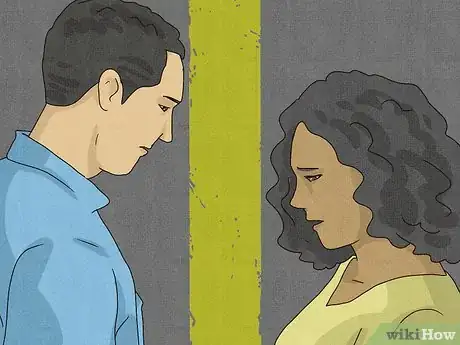This article was co-authored by Asa Don Brown, PhD, DNCCM, FAAETS and by wikiHow staff writer, Hannah Madden. Dr. Asa Don Brown is a Clinical Psychologist with over 25 years of experience. He specializes in working with families, children, and couples, treating a variety of psychological disorders, trauma, and abuse. Dr. Brown has specialized in negotiation and profiling. He is also a prolific author having published three books and numerous articles in magazines, journals, and popular publications. Dr. Brown earned a BS in Theology and Religion with a minor in Marketing and an MS in Counseling with a specialization in Marriage and Family from The University of Great Falls. Furthermore, he received a PhD in Psychology with a specialization in Clinical Psychology from Capella University. He is also a candidate for a Masters of Liberal Arts through Harvard University. Dr. Brown is a Fellow of the American Academy of Experts in Traumatic Stress and a Diplomate for the National Center for Crisis Management and continues to serve a number of psychological and scientific boards.
There are 7 references cited in this article, which can be found at the bottom of the page.
This article has been viewed 18,289 times.
After the initial hurt of being traumatized by someone, you’re left with the question of whether or not to forgive them (and how to do it). Forgiving someone who has hurt you can lead to fewer negative emotions and more healing in your own life.[1]
If you’ve made the decision to forgive someone in your life, read through these steps to see how you can get started.
This article is based on an interview with our clinical psychologist and published author, Asa Don Brown. Check out the full interview here.
Steps
Expert Q&A
-
QuestionDoes forgiveness heal trauma?
 Asa Don Brown, PhD, DNCCM, FAAETSDr. Asa Don Brown is a Clinical Psychologist with over 25 years of experience. He specializes in working with families, children, and couples, treating a variety of psychological disorders, trauma, and abuse. Dr. Brown has specialized in negotiation and profiling. He is also a prolific author having published three books and numerous articles in magazines, journals, and popular publications. Dr. Brown earned a BS in Theology and Religion with a minor in Marketing and an MS in Counseling with a specialization in Marriage and Family from The University of Great Falls. Furthermore, he received a PhD in Psychology with a specialization in Clinical Psychology from Capella University. He is also a candidate for a Masters of Liberal Arts through Harvard University. Dr. Brown is a Fellow of the American Academy of Experts in Traumatic Stress and a Diplomate for the National Center for Crisis Management and continues to serve a number of psychological and scientific boards.
Asa Don Brown, PhD, DNCCM, FAAETSDr. Asa Don Brown is a Clinical Psychologist with over 25 years of experience. He specializes in working with families, children, and couples, treating a variety of psychological disorders, trauma, and abuse. Dr. Brown has specialized in negotiation and profiling. He is also a prolific author having published three books and numerous articles in magazines, journals, and popular publications. Dr. Brown earned a BS in Theology and Religion with a minor in Marketing and an MS in Counseling with a specialization in Marriage and Family from The University of Great Falls. Furthermore, he received a PhD in Psychology with a specialization in Clinical Psychology from Capella University. He is also a candidate for a Masters of Liberal Arts through Harvard University. Dr. Brown is a Fellow of the American Academy of Experts in Traumatic Stress and a Diplomate for the National Center for Crisis Management and continues to serve a number of psychological and scientific boards.
Clinical Psychologist Definitely! Forgiveness has the ability to allow healing to occur and let the wound transform into a scar, which is a reminder of a wound that is no longer festering and capable of causing you pain.
Definitely! Forgiveness has the ability to allow healing to occur and let the wound transform into a scar, which is a reminder of a wound that is no longer festering and capable of causing you pain. -
QuestionWhy is forgiveness so very important?
 Asa Don Brown, PhD, DNCCM, FAAETSDr. Asa Don Brown is a Clinical Psychologist with over 25 years of experience. He specializes in working with families, children, and couples, treating a variety of psychological disorders, trauma, and abuse. Dr. Brown has specialized in negotiation and profiling. He is also a prolific author having published three books and numerous articles in magazines, journals, and popular publications. Dr. Brown earned a BS in Theology and Religion with a minor in Marketing and an MS in Counseling with a specialization in Marriage and Family from The University of Great Falls. Furthermore, he received a PhD in Psychology with a specialization in Clinical Psychology from Capella University. He is also a candidate for a Masters of Liberal Arts through Harvard University. Dr. Brown is a Fellow of the American Academy of Experts in Traumatic Stress and a Diplomate for the National Center for Crisis Management and continues to serve a number of psychological and scientific boards.
Asa Don Brown, PhD, DNCCM, FAAETSDr. Asa Don Brown is a Clinical Psychologist with over 25 years of experience. He specializes in working with families, children, and couples, treating a variety of psychological disorders, trauma, and abuse. Dr. Brown has specialized in negotiation and profiling. He is also a prolific author having published three books and numerous articles in magazines, journals, and popular publications. Dr. Brown earned a BS in Theology and Religion with a minor in Marketing and an MS in Counseling with a specialization in Marriage and Family from The University of Great Falls. Furthermore, he received a PhD in Psychology with a specialization in Clinical Psychology from Capella University. He is also a candidate for a Masters of Liberal Arts through Harvard University. Dr. Brown is a Fellow of the American Academy of Experts in Traumatic Stress and a Diplomate for the National Center for Crisis Management and continues to serve a number of psychological and scientific boards.
Clinical Psychologist The consequences of leaving something unforgiven not only affects you, but the people around you. When you retain resentment for someone else, you end up containing anger, hostility, and a barrage of emotional wounds that are left unhealed. Pain that's left unchecked can manifest into a variety of physiological and psychological disorders—likewise, pain left unchecked can have an effect upon your perceptions and worldviews, which in turn has an effect on the people who are in your inner circle.
The consequences of leaving something unforgiven not only affects you, but the people around you. When you retain resentment for someone else, you end up containing anger, hostility, and a barrage of emotional wounds that are left unhealed. Pain that's left unchecked can manifest into a variety of physiological and psychological disorders—likewise, pain left unchecked can have an effect upon your perceptions and worldviews, which in turn has an effect on the people who are in your inner circle. -
QuestionWhat to do when you don't want to forgive someone?
 Asa Don Brown, PhD, DNCCM, FAAETSDr. Asa Don Brown is a Clinical Psychologist with over 25 years of experience. He specializes in working with families, children, and couples, treating a variety of psychological disorders, trauma, and abuse. Dr. Brown has specialized in negotiation and profiling. He is also a prolific author having published three books and numerous articles in magazines, journals, and popular publications. Dr. Brown earned a BS in Theology and Religion with a minor in Marketing and an MS in Counseling with a specialization in Marriage and Family from The University of Great Falls. Furthermore, he received a PhD in Psychology with a specialization in Clinical Psychology from Capella University. He is also a candidate for a Masters of Liberal Arts through Harvard University. Dr. Brown is a Fellow of the American Academy of Experts in Traumatic Stress and a Diplomate for the National Center for Crisis Management and continues to serve a number of psychological and scientific boards.
Asa Don Brown, PhD, DNCCM, FAAETSDr. Asa Don Brown is a Clinical Psychologist with over 25 years of experience. He specializes in working with families, children, and couples, treating a variety of psychological disorders, trauma, and abuse. Dr. Brown has specialized in negotiation and profiling. He is also a prolific author having published three books and numerous articles in magazines, journals, and popular publications. Dr. Brown earned a BS in Theology and Religion with a minor in Marketing and an MS in Counseling with a specialization in Marriage and Family from The University of Great Falls. Furthermore, he received a PhD in Psychology with a specialization in Clinical Psychology from Capella University. He is also a candidate for a Masters of Liberal Arts through Harvard University. Dr. Brown is a Fellow of the American Academy of Experts in Traumatic Stress and a Diplomate for the National Center for Crisis Management and continues to serve a number of psychological and scientific boards.
Clinical Psychologist Think about what a lack of forgiveness means for you in the long term. If you feel this way, you're holding onto pain that will have a deep impact on your life. Forgiveness allows your grudges, bitterness, and resentment to go away, which allows you to come to a place of peace and personal acceptance. Remember—forgiveness doesn't allow someone to get away with what they've done; instead, it allows those painful events to be removed from your mind and body.
Think about what a lack of forgiveness means for you in the long term. If you feel this way, you're holding onto pain that will have a deep impact on your life. Forgiveness allows your grudges, bitterness, and resentment to go away, which allows you to come to a place of peace and personal acceptance. Remember—forgiveness doesn't allow someone to get away with what they've done; instead, it allows those painful events to be removed from your mind and body.
References
- ↑ https://www.psychologytoday.com/us/blog/mindful-anger/201605/how-do-you-forgive-even-when-it-feels-impossible-part-2
- ↑ Asa Don Brown, PhD, DNCCM, FAAETS. Clinical Psychologist. Expert Interview. 3 February 2022.
- ↑ https://www.psychologytoday.com/us/blog/mindful-anger/201409/how-do-you-forgive-even-when-it-feels-impossible-part-1
- ↑ Asa Don Brown, PhD, DNCCM, FAAETS. Clinical Psychologist. Expert Interview. 3 February 2022.
- ↑ https://www.mayoclinic.org/healthy-lifestyle/adult-health/in-depth/forgiveness/art-20047692
- ↑ Evan Parks, PsyD. Licensed Clinical Psychologist. Expert Interview. 26 October 2021.
- ↑ Evan Parks, PsyD. Licensed Clinical Psychologist. Expert Interview. 26 October 2021.
- ↑ Asa Don Brown, PhD, DNCCM, FAAETS. Clinical Psychologist. Expert Interview. 3 February 2022.
- ↑ https://www.psychologytoday.com/us/blog/mindful-anger/201605/how-do-you-forgive-even-when-it-feels-impossible-part-2
- ↑ https://www.mayoclinic.org/healthy-lifestyle/adult-health/in-depth/forgiveness/art-20047692
- ↑ https://www.hopkinsmedicine.org/health/wellness-and-prevention/forgiveness-your-health-depends-on-it
- ↑ Asa Don Brown, PhD, DNCCM, FAAETS. Clinical Psychologist. Expert Interview. 3 February 2022.
- ↑ https://www.mayoclinic.org/healthy-lifestyle/adult-health/in-depth/forgiveness/art-20047692
- ↑ https://www.hopkinsmedicine.org/health/wellness-and-prevention/forgiveness-your-health-depends-on-it
- ↑ https://www.hopkinsmedicine.org/health/wellness-and-prevention/forgiveness-your-health-depends-on-it
- ↑ Evan Parks, PsyD. Licensed Clinical Psychologist. Expert Interview. 26 October 2021.
- ↑ https://stanfordmag.org/contents/8-tips-for-forgiving-someone-who-hurt-you
- ↑ https://www.mayoclinic.org/healthy-lifestyle/adult-health/in-depth/forgiveness/art-20047692
- ↑ https://www.psychologytoday.com/us/blog/mindful-anger/201605/how-do-you-forgive-even-when-it-feels-impossible-part-2



















-Step-15-Version-2.webp)



















































